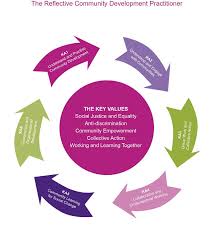National Occupational Standards (NOS), specify the standards of performance individuals must achieve in the workplace, together with the knowledge and understanding required for roles, for community development work. They were originally developed by Paulo, The National Training Organisation for Community Learning and Development in 1999/2000. Paulo produced the world’s first ever National Occupational Standards for Community Development.
Paulo was established in 1999 by the new Labour government in Britain and represented interests from across the community learning and development professional sector and professional education and training. Its first chair was Charlie McConnell, at the time CEO of the Scottish Community Education Council and Secretary General of IACD. In 2003 Paulo became part of the UK’s Lifelong Learning Sector Skills Councils.
The Federation of Community Development Learning in England, the CLD Standards Council for Scotland, Community Development Cymru (Wales) and Community Work Education and Training Network have reviewed the previous iterations of the Standards the Community Development and develop this new version which you can download below.
“The National Occupational Standards outline clearly the skills, values and processes required for effective and appropriate community development practice. Community development is undertaken by a wide range of people in different settings and roles. Community development practitioners may be paid (employed workers) or unpaid (community activists and voluntary workers), and all need to be competent in the necessary skills and knowledge and to work with integrity to support communities who may have few recognised resources and limited access to decision makers.
The Standards applied to practice will ensure that community development impacts on poverty, racism and social exclusion in a way that empowers, enables and encourages participation.”
The summary of the NOS describes their role and purpose. It sets out key values, key areas and standards that relate to these, emphasising the role of the reflective practitioner.
Download: Summary of CD NOS 2015
If you want to explore aspects of the standards in more detail, the full standards detail the knowledge and understanding required for each of the 25 standards and illustrate how the community development values inform practice.
Download: CD NOS 2015

